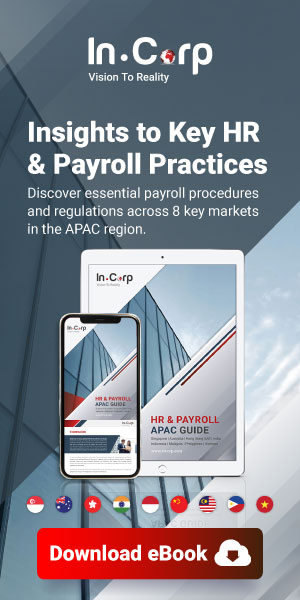Setting Up Business In Singapore for Foreigners
 Singapore is a prime location in the Asia Pacific for conducting business, offering solid trademark IP protection, an attractive corporate tax framework, superb connectivity, a strategic geographical position close to major emerging markets, and extensive trade agreements with over 100 regions worldwide. Due to these exceptional achievements, Singapore is the perfect place to establish a new company, open a subsidiary, or set up a branch or representative office in Asia. For seamless entry into this dynamic market, consider InCorp’s experienced company formation consultants who specialize in foreign company setup in Singapore.
Singapore is a prime location in the Asia Pacific for conducting business, offering solid trademark IP protection, an attractive corporate tax framework, superb connectivity, a strategic geographical position close to major emerging markets, and extensive trade agreements with over 100 regions worldwide. Due to these exceptional achievements, Singapore is the perfect place to establish a new company, open a subsidiary, or set up a branch or representative office in Asia. For seamless entry into this dynamic market, consider InCorp’s experienced company formation consultants who specialize in foreign company setup in Singapore.
Understanding the Singapore Company Registration Process
 It must be noted that ACRA Singapore – the Accounting & Corporate Regulatory Authority of Singapore, mandates that all Singaporean companies must be registered under the country’s Companies Act and abide by its rules and regulations.
It must be noted that ACRA Singapore – the Accounting & Corporate Regulatory Authority of Singapore, mandates that all Singaporean companies must be registered under the country’s Companies Act and abide by its rules and regulations.
Requirements for Starting a Company in Singapore
The timeframe for this process varies depending on the company’s structure and complexity, as well as the completeness of the required documents, but the Singapore government has worked tirelessly to streamline the process. One of the key requirements is that you must also have at least one director who is a Singapore citizen, a permanent resident, or an employment pass holder. If you are not a permanent resident or work pass holder, you can still fulfil the local director requirement by appointing a nominee director or authorised representative who must be a locally resident individual in Singapore. This is because the city-state does not allow a foreign individual or entity to register their company independently. This is also where a corporate secretarial firm can come in handy, assisting in meeting these requirements and paving the way for your successful Singapore company registration process. Additionally, every foreign company setting up in Singapore must have a registered address within the country.Registering Your Company with ACRA Singapore (Accounting Corporate Regulatory Authority)
Once all the required documents are ready, you can proceed to formally register your company with ACRA Singapore. The online registration procedure through BizFile+ is efficient and straightforward. It includes the following steps:- Application for a new company name
- Submission of company incorporation documents
- Payment of registration fees
- Issuance of Certificate of Incorporation
Online Submission via BizFile+
ACRA offers a smooth and user-friendly process for online company setup in Singapore through its BizFile+ portal. To access the BizFile+ platform, business users are required to log in with their UEN or government corporate account, while individuals can access the platform using an ACRA login.Selecting the Ideal Business Structure
 Once you grasp the requirements for starting a business in Singapore, you can explore the various business structures that Singapore offers to find the best fit for your entrepreneurial vision. If you’re wondering how to start a company in Singapore, you’ll find several options available. The types of business structures in Singapore include:
Once you grasp the requirements for starting a business in Singapore, you can explore the various business structures that Singapore offers to find the best fit for your entrepreneurial vision. If you’re wondering how to start a company in Singapore, you’ll find several options available. The types of business structures in Singapore include:
- Private Limited Company (most common)
- Limited Partnership
- Limited Liability Partnership (LLP)
- Sole Proprietorship
- Company Limited by Guarantee
- Variable Capital Company (VCC)
- Representative Office
- Branch Office/Foreign Branch
Private Limited Company (Pte Ltd)
One of the most popular and flexible business structures in the city-state is the Singapore Private Limited Company (Pte Ltd). This structure offers the following advantages to people starting a business in Singapore:- Limited liability and separate legal entity, ensuring that shareholders’ liability is restricted to the capital amount they have contributed. This safeguards the personal assets of the shareholders in the event of financial challenges.
- Considered a dynamic, credible, and scalable structure that meets the requirements of a growing business.
- Provides flexibility in financing, operations, and management.
Limited Partnership
This particular company setup in Singapore is a business arrangement where there must be at least one general partner with unlimited liability and one or more limited partners whose liability is capped at their investment. This setup allows for separating management and investment roles, with the general partner handling daily operations. It is a flexible structure, but it does not have a separate legal identity, meaning the partnership itself cannot own assets or sue. Registration with ACRA is required, and a partnership agreement is recommended to define the terms of the partnership.Limited Liability Partnership (LLP)
For professionals in shared fields, a Limited Liability Partnership (LLP) might be a viable business structure. An LLP is a business structure that merges the flexibility of operating as a partnership with the advantages of limited liability, akin to that of a corporation. To establish an LLP, you will need to request a business name and officially register the LLP with ACRA. Additionally, a minimum of two partners must be appointed, and at least one manager must be a resident who is at least 18 years old. Let InCorp’s business incorporation services in Singapore help you streamline this process.Sole Proprietorship
Known for its simplicity in establishment and management, this business structure is designed for a single individual who assumes unlimited liability as the business and owner are legally indistinguishable. This is often the first step for individuals wondering how to start a company in Singapore.Company Limited by Guarantee
This is a company entity commonly used for non-profit activities, such as charitable organisations and associations. Unlike companies limited by shares, where the liability of members is limited to the amount, if any, unpaid on the shares they hold, the liability of the members of a CLG is limited to the amount they have agreed to contribute to the assets of the company in the event of its winding up. This amount is usually specified in the company’s constitution. For non-profits exploring how to register a company in Singapore, this structure is often ideal.Variable Capital Company (VCC)
A VCC is an innovative corporate structure introduced in Singapore to enhance the attractiveness of Singapore as a hub for fund management and domiciliation. It allows for a flexible capital structure, enabling shares to be issued and redeemed without having to alter the company’s constitution. This feature is particularly beneficial for investment funds, as it allows them to manage subscriptions and redemptions efficiently.Representative Office
A Representative Office is an ideal setup for foreign companies looking to explore the viability of doing business in Singapore without committing to a full-fledged incorporation. This setup allows companies to conduct market research, understand the business environment, and facilitate meetings with potential clients and partners. Although a Representative Office cannot engage in commercial revenue-generating activities, it benefits from the prestige of a local presence and minimal compliance requirements. It serves as a low-risk entry strategy for companies considering long-term investment and operations in the vibrant Singaporean economy. Foreign company setup in Singapore often begins with establishing a Representative Office.Branch Office/Foreign Branch
A branch office in Singapore functions as an extension of a foreign parent company, allowing for direct engagement in business activities within the region. The parent company remains liable for the branch’s actions and debts, necessitating careful consideration. To set up a branch office, at least one resident agent must be appointed to handle compliance, and the branch must have a registered Singapore address, ensuring adherence to local corporate regulations. This structure is often recommended by company formation consultants for foreign businesses needing a strong local presence.Preparing Necessary Documents to Open Company in Singapore
 Having chosen the perfect business structure, your next course of action involves preparing the required documents for registration. This is how to open a company in Singapore:
Having chosen the perfect business structure, your next course of action involves preparing the required documents for registration. This is how to open a company in Singapore:
- Choosing a company name
- Appointing directors and shareholders
- Preparing the company constitution
- Appointing a company secretary
- Providing a registered office address
- Determining the share capital
- Obtaining consent to act as director and shareholder, accompanied by a statement of non-disqualification
Company Name Approval
Choosing the perfect name for your company is crucial, as it is the first point of contact between your business and potential customers. The name should be unique, devoid of obscene or religious terms, and accurately represent the identity of your brand. After settling on an appropriate name, you can seek approval for your company name from ACRA. This process usually takes less than an hour, provided the name meets ACRA’s guidelines.Check Your Singapore Name Availability!
How to Register Your Company Name?
1Complete Online Form
2Conduct Name Search With Our Help
3Sign Documents
4Incorporate Your Company in Singapore
Incorporation Documents
Once the company name is approved, the next step is to prepare the incorporation documents. These documents serve as evidence of your company’s legitimacy, ownership structure, and adherence to legal obligations. The incorporation documents to open a company in Singapore include:- The company constitution, which comprises regulations about the internal administration of the company
- Director/shareholder consent forms that verify the willingness and eligibility of the designated individuals to undertake the duties and responsibilities associated with their respective positions
- Identification details of all company officers, shareholders, and beneficial owners
- A brief description of the company’s activities and SSIC code
- A registered office address
- Share capital details
Post-Incorporation Procedures and Compliance
After successful company registration, you must complete various crucial tasks and meet compliance requirements. These include creating a company business profile, opening a corporate bank account, obtaining necessary business licenses and permits, and fulfilling annual filing requirements.Opening a Corporate Bank Account
Establishing a corporate bank account in Singapore is a vital step for your newly registered company. The process involves:- Ascertaining the business structure
- Furnishing appropriate documentation and proof of registration
- Proof of identification
- Proof of residential address
- Completing the account opening forms.
Obtaining Business Licenses and Permits in Singapore
Depending on your company’s operations, certain business licenses and permits may be required. Operating a business in Singapore without the necessary licenses and permits could result in significant penalties, potential exclusion from professional organisations, or even the cessation of business activities.Intellectual Property – International Trademark Registration
When registering your business, safeguarding your IP is a vital step to protect your brand value, specifically through methods such as registering a trademark. We recommend international trademark registration in Singapore, facilitated through the Madrid Protocol, which offers a streamlined and cost-effective solution for businesses looking to protect their brands globally. The Madrid Protocol is an international treaty administered by the World Intellectual Property Organization (WIPO), allowing businesses to apply for trademark protection in multiple countries simultaneously through a single application.Annual Filing Requirements for Singapore Companies
To stay in good standing with ACRA, Singapore-incorporated companies must submit their annual returns within 30 days of conducting an AGM. Failure to meet these requirements can result in significant penalties, so it is important to mark these deadlines in your calendar.Expert Tips for Entrepreneurs Registering a Company in Singapore
Entrepreneurs who wish to open a company in Singapore should consider the following:- Appointing a Singaporean, Permanent Resident, or EntrePass holder as a local director
- Appointing a nominee director
- Relocating with an Employment Pass (EP), EntrePass, or ONE Pass work visa
- Applying for an EntrePass specifically designed for new business initiation and management.
How Can InCorp Help You Start a Company in Singapore?
As noted above, the entrepreneurial environment is so evolved in the city-state that it takes only a few hours for Singapore business registration consultants such as InCorp to help with new company setup, incorporation, and outsourcing your accounting and finance paperwork. Our team of company registration consultants ensures all the key requirements needed to register the entity and manage several post-incorporation requirements including annual filing requirements with ACRA and the Inland Revenue Authority of Singapore (IRAS), accounting and bookkeeping, PEO, and payroll management, among many others. If you are a foreigner learning how to set up a company in Singapore, you must engage the services of a corporate service provider for the company setup. Even if you are a local entrepreneur, you are advised to do the same, as they may not be fully familiar with Singapore company law and compliance requirements. InCorp is an award-winning provider of professional corporate solutions, such as company registration services, for new business owners. We have helped thousands of global entrepreneurs and companies launch their Singapore ventures successfully. Count on our experienced team for the incorporation, corporate secretarial, and compliance of your company.Frequently Asked Questions About Company Registration in Singapore
What are the requirements for company incorporation in Singapore?
- To set up a company in Singapore successfully, you’d need the following:
- 1 shareholder (at minimum)
- 1 resident director
- 1 company secretary
- $1 paid-up capital
- Local registered address
- Documents required for non-residents: passport, proof of address, bank reference letter
- Documents required for residents: Singapore ID, passport for foreigners
How long will the company incorporation process take?
- You’d be surprised to learn that you can start a company in Singapore in as little as one day. Singapore’s open stance towards increasing investments in the local economy has made the incorporation process a lot smoother.
How much does it cost to incorporate a company in Singapore?
- The total costs may vary depending on the method you choose. Self-registration goes for as low as $115 – which includes your business name and entity with the Accounting and Corporate Regulatory Authority (ACRA). Choosing an agency to help you with the paperwork will incur additional costs. That said, it is relatively inexpensive to incorporate in Singapore.

